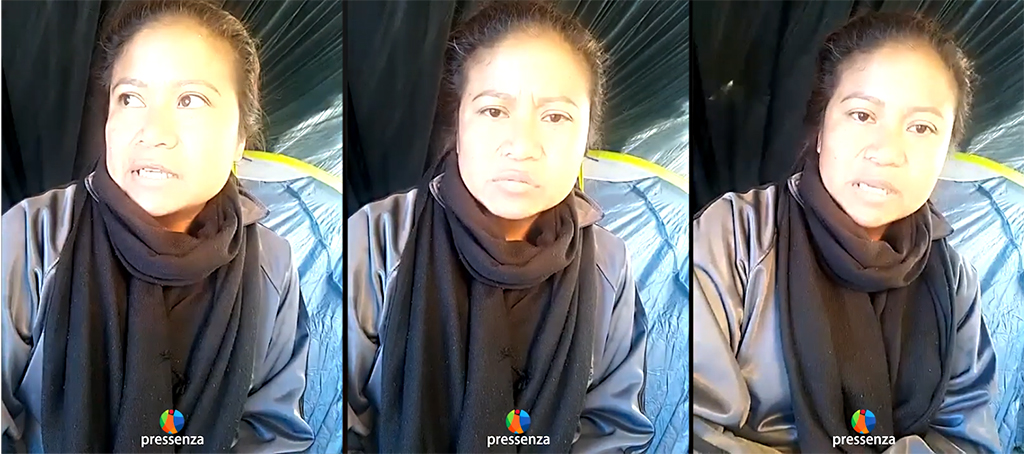Between 8 and 30 June, around 2,000 indigenous peoples camped out in Brasilia in front of the Supreme Federal Court (STF) – Brazil’s highest legal instance – to reject the application of the “temporary framework” in a case brought by the State of Santa Catarina. If approved, the ruling would set a precedent sufficient to legalise the usurpation of indigenous lands, which has grown brutally under the Bolsonaro government. The STF postponed its ruling to 25 August, but the communities will continue to be exposed to all kinds of violence, as the occupations that have been taking place are accompanied by attacks on the people, physical aggression, threats and even assassinations. As they continue to fight for their rights, the indigenous peoples are demanding support to denounce and defend themselves against invaders and the authorities in power. “This struggle is not ours alone,” they say.
Some facts to understand the conflict
- Brazil’s constitution recognises indigenous peoples’ rights, among others, to the lands “which they traditionally occupy, their permanent possession and the exclusive usufruct of the riches of the soil…”.
- Recently the Constitution and Justice Commission released for discussion in the Chamber of Deputies Bill 490 (PL490), which among other things promotes the so-called “temporary framework”. This is a constitutional interpretation tailored to the needs of rural and extractivist groups, according to which indigenous peoples would only have the right to the lands they were occupying before 5/10/1988, the date of promulgation of the current constitution.
- Based on the “time frame”, the State of Santa Catarina claims lands recognised as traditional territory of the Kokleng people. The importance of the case lies in the fact that it was defined as one of “general repercussion”, that is to say that the judgment will be a reference for the resolution of all future processes related to the demarcation of indigenous lands.
The above data gives some legal references to this conflict, but does not reflect the violence and anguish suffered by the people involved.
Neusa Kunhã Takuá, vice cacica of the Tekohá DjE’y Village of Paraty, in the state of Rio de Janeiro, spoke to Pressenza about this.
They want to legalise illegality
This is a very difficult time for us,” says Neusa. The timeframe directly affects our lives, our existence.”
“All of the territories that are in the hands of the illegal armed groups are in the hands of the state. “All the territories that are in the process of demarcation will no longer be demarcated because they want to take us off our land, and where will we go?
“In the middle of the pandemic we are forced to leave our homes, to bring our children, the elderly, pregnant women to Brasilia, to put our lives at risk, to defend ourselves from the massacre that the government wants to do and is already doing to us. We are obliged to take to the streets and come here to say that what they are trying to do is unacceptable, that what they want is to exterminate us.”
“Bolsonaro and the Bolsonaristas oppose demarcation because they want to exploit our resources. Ruralists, agribusiness, garimpeiros (miners), loggers… They want to do what they are already doing even on demarcated lands. What they want is to legalise illegality”.

Neusa Kunhã Takuá, vice cacica of the Tekohá DjE’y Village of Paraty
Violence and fear
While the judicial processes continue, the communities suffer violent aggressions in their own territories. Neusa describes the situation in her community, which is replicated with some variations in other cases.
“We have been suffering threats from garimpeiros, grileiros (usurpers of land), loggers and real estate speculation supported by the government. The government inflames violence by supporting squatters! They insult us, they threaten us with death. They are racist and feel entitled to expose their racism on social media and in the street. We cannot live peacefully in our own house.
In 2017, after a neighbour threatened to kill at least 3 indigenous people if they wanted to remove him from the place, Neusa’s brother was killed. He was 42 years old. Now she herself is under death threat. However, she adds:
“At no time do I feel fear, because my faith comes from Nhanderú, perhaps because my family is descended from pajés (spiritual authority). It is something I cannot explain, a feeling that exists within us. Of course, I am scared and worried, but I feel ready for this fight, to defend my people and my family and to show society that we women also have the strength.
We need the support of the whole society
Neusa concludes by saying:
“We are talking about life; we are fighting for survival. We need people to join us, to shout with us ‘No to the timeframe’, to spread the word on social networks, for people to give their opinion and, as far as they can, to put pressure on the MPs, on the government”.
“Protect your indigenous peoples! You should be proud of us because this struggle is not only ours! When an indigenous land is recognised, the life and environment of that place is protected by our peoples. We want our lands to plant, to preserve the waters, the nature and that is for everyone. Each one of you wants your children to breathe clean air, to drink clean water in the future. We need the support of the whole society, we live together in the same house!
“Brazil has a history that we will not allow to be ignored. In this history, the land belongs to the original peoples.
As we close this article, the Tekohá DjE’y community denounces: “On 11/07, two armed men entered the village to violate, assault and threaten all its inhabitants. One of them was detained by the women until the arrival of the police and subsequently arrested. The other man fled.
Watch the full interview with Neusa Kunhã Takuá (in Portuguese)
#marcotemporalnão #PL490não #demarcaçãojá #ForaBolsonaro @tekohadjey






